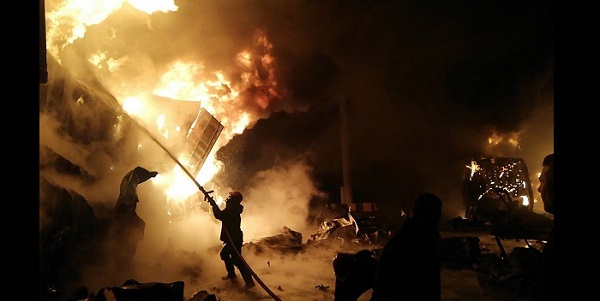Israel’s Air Strikes on Syria

From Current Affairs Notes for UPSC » Editorials & In-depths » This topic
IAS EXPRESS Vs UPSC Prelims 2024: 85+ questions reflected
What is the background?
- The crisis in Syria has evolved over the years and is multi-faceted.
- The country’s president, Bashar al-Assad, has defeated the rebel groups with the help of Russia and Iran. Almost all the territories, except Idlib, has been recaptured.
- However, this apparent victory didn’t put an end to the conflict.
- Iran has established its influence in Syria. This is viewed by Israel as a security threat– as it has been occupying the Golan Heights region for decades now.
- Russia has largely kept away from this cold war ranging between Israel and Iran. Its key concerns are the survival of the Assad government and the protection of its own assets and troops deployed in the region.
- This has given Israel a free hand in the region to attack the Iranian and Hezbollah shipments.
What are the recent developments?
- Recently, a missile strike on Syria’s main seaport, Latakia Port, triggered a fire. This is the 2nd strike on this major Mediterranean port in December, 2021.
- Syria has blamed Israel for both the strikes. The Israeli authorities neither confirmed nor denied these accusations.
- However, it is an established fact that Israel has been carrying out air strikes inside Syrian territory in the recent years.
Why is Israel’s approach problematic?
- In early December, Israel’s PM held that his troops are ‘pushing back on bad forces’ in the region.
- However, the approach has issues:
- These repeated attacks are a violation of Syria’s sovereignty. Israel is known to violate certain international laws and norms with regards to its security policies. These missile-strikes are setting another bad precedent.
- Syria is already devastated by its civil war. It is now turning into a new front for the Israel-Iran proxy war.
- In addition to this, Israel has been reportedly carrying out sabotage activities in Iran. For example, there have been reports of assassination of Iranian nuclear scientists.
- In retaliation, Iran, attacked vessels (linked to Israel) in the Gulf and Mediterranean regions. It has also increased supplies to the rebel groups to further fuel the conflict.
What is the way ahead?
- The strike on Latakia Port comes at a crucial time– when the West is trying to restart the talks on the 2015 Iran nuclear deal (Joint Comprehensive Plan of Action).
- This key deal took a hit in 2018 when USA withdrew from it and imposed sanctions on Iran.
- Recently, USA’s re-entry and the deal’s revival is being discussed by the parties in Vienna.
- Notable, Israel has been absent at these negotiations.
- If these attempts fail, Iran may proceed with its nuclear program– which in turn would increase the possibility of a military conflict between Israel and Iran.
- In this light, Syria appears to be a mere pawn in this game, played by the major powers in West Asia.
- Damascus has been weakened by the civil war and is largely dependent on Russia and Iran for its survival. It lacks the resources and the political will to deter foreign powers from waging proxy wars in its territory.
- For Syria to see any semblance of peace, tensions between Iran and Israel needs to subside. Reviving the nuclear deal would be a good starting point.
Conclusion:
The recent Latakia strike is only another addition to a long list of damage caused by proxy wars in 3rd countries. Peace in Syria is dependent on diplomatic resolution of disputes between larger countries like Israel and Iran.
Referred Sources
If you like this post, please share your feedback in the comments section below so that we will upload more posts like this.

